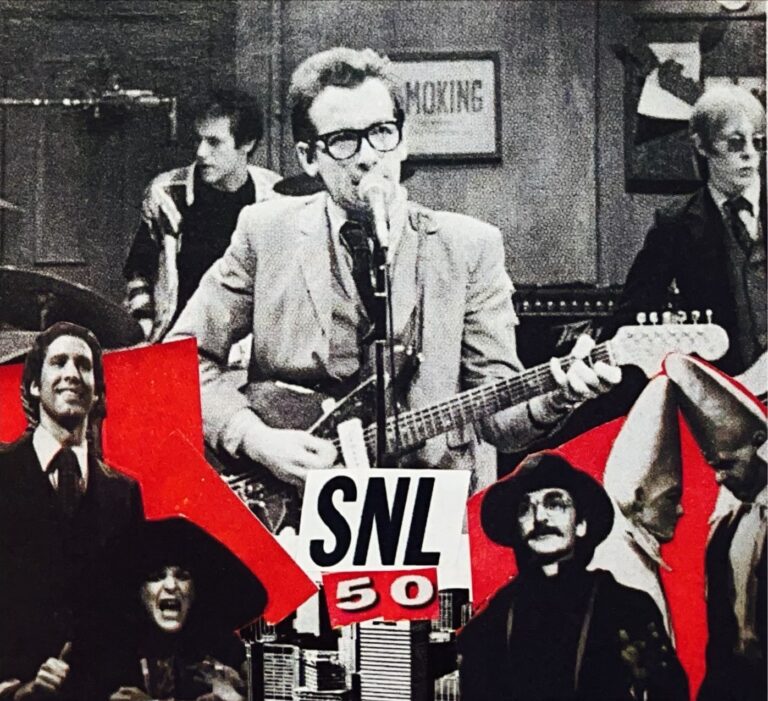It’s Homecoming Weekend at Studio 8H! Tune into Saturday Night Live’s 50th Anniversary Special this Sunday @8 pm EST on NBC and Peacock, to catch a half-century of sketches, musical performances, and appearances from all your favorite stars of the SNLverse.
In the wake of the Vietnam War, Watergate, a wave of political assassinations, and sudden economic turmoil following the Age of Affluence, a decade of disillusionment was born: the 1970s. Public disillusionment of the ’70s was not simply a shared sense of uncertainty (that was certainly a feature of the entire Cold War era), but rather—echoing the late “Rock & Roll President” from Georgia—a historically unique “Crisis of Confidence” in the basic functions of liberal democracy and the radically optimistic ethos of the “American Dream” that flourished in the 1950s and 60s. To make a long story short, the “Crisis of Confidence,” in some respects, was the first domino in the rise of Reaganism and the subsequent establishment of the neoliberal order. As historian Thomas Borstelmann put it, “[The 1970s] was the seedbed for the growth of an extraordinary new confidence in market solutions. […] Economists, political leaders, and average citizens all turned increasingly to the idea of the market—unregulated by the government.” Heck, if it’s any indication that the dream of the 1960s was waning, by the mid-70s, Jerry Rubin—the gonzo king of the American left’s isle of misfit toys—went from anti-capitalist yippie to yuppie Wall Street stockbroker, practically overnight.
“The establishment is winning
Now the battle’s nearly won
The rebels are conforming
See the father, now the sons
All the urgency and energy
Has turned into complacency
Now the schools and universities are turning out a
Brand new breed of young conservatives”
-The Kinks, “Young Conservatives” (1983)
Although the establishment certainly won the decade on the political front, the cynical zeitgeist of the era materialized a bit differently within the realm of popular culture. As right-wingers railed against Washington, the new kids on the block (the twentysomethings of the entertainment industry) rebelled against cultural institutions of the mid-20th century, proving that amidst conformity there was still:
“A place in the world for the angry young man
With his working-class ties and his radical plans.“
-Billy Joel, “Prelude/Angry Young Man” (1976)
In cinema, Martin Scorsese, Francis Ford Coppola, and Stanley Kubrick surpassed the artistic confines of Hollywood’s Golden Age; in music, Waylon Jennings, Jessi Colter, Willie Nelson, and Kris Kristofferson pioneered outlaw country through resisting the chokehold of the Nashville machine; and in television, the old boys club at 30 Rock reluctantly took a chance on Lorne Michaels—a scrappy young writer from Canada and his ragtag team of nobodies—The Not Ready for Prime Time Players. Yep, half a century ago, with the utterance of six little words— “Live from New York, it’s Saturday Night!”—late night’s irreverent revolution was born.
From SNL’s inception, musical performances—that part of the show you fast-forward through on Sunday mornings—were integral to the boomer insurgency. Featuring everything from the glitz and glamour of Studio 54 to the raw grimy energy of CBGB and Max’s Kansas City, SNL’s eclectic mix of ‘young people’s music’ went well beyond cutting-edge programs of the Eisenhower era (The Ed Sullivan Show & American Bandstand). Notably, through being the first major American television show to showcase hip-hop (Funky Four Plus One, S6 – EP10), hardcore punk (Fear, S7 – EP4), and new wave (Devo, S4 – EP2), SNL played a significant role in introducing underground sounds to the masses.
While it’s certainly been no renaissance, Season 50 of SNL has, at times, felt quite vintage. The outlandishly gory nature of the sketch “Earring” (Paul Mescal, EP8) and really anything written by self-proclaimed “body-horror comic” Sarah Sherman emulate that surreal brand of physical comedy that helped define the early essence of the show (“The French Chef,” S4 – EP8). Additionally, I can’t help but think of a young Norm MacDonald every time the incredibly dry-witted Michael Longfellow joins Che and Jost behind the update desk. Nevertheless, with its lack of recurring original characters, over-reliance on celebrity cameos, and cringe-worthy glorification/normalization of the establishment (The Hillary Clinton “Hallelujah” cold open + Elon & Trump’s hosting stints), I’m certainly not alone in saying that SNL has, in many respects, become what it once strived to counter. Despite this, I always find myself coming back for more. It’s as if SNL is my favorite sports team; win or lose, if it’s Saturday at 11:30 pm, I’m watching! Fairweather fans—those who don’t watch the show through rose-colored glasses—might question the reverence diehards hold toward the series. In their defense, we live in postmodern times; irony fuels casual conversation and virtually everyone and everything within the public sphere has been satirized. Thus, fifty years later, it is difficult to grasp just how subversive it once was to make crass sex jokes and impersonate the POTUS in a bumbling manner (Chevy Chase’s portrayal of Gerald Ford) on national television. But, perhaps venturing into the SNL archive will do the trick. Ladies and gentlemen, in honor of SNL’s 50th Anniversary celebration, here are five sketches from the ’70s that capture the original spirit of the show.
“It’s an all-nighter in the city. It’s catching Richard Pryor at a drop in or finding Paul Simon strumming in the back of a dive bar. It’s meeting a girl outside of a bodega and getting lucky in a phone booth. It’s everything you think is going to happen when you move to the city.”
– Gabriel Labelle as Lorne Michaels in Saturday Night (2024)
5. “Lorne Begs The Beatles” (S3 – EP1)
4. “Sex in Cinema” (S3 – EP3)
3. “Landshark” (S1 – EP4)
2. “Consumer Probe: Irwin Mainway” (S2 – EP10)
1. “American Dope Growers Union” (S2 – EP20)




great piece